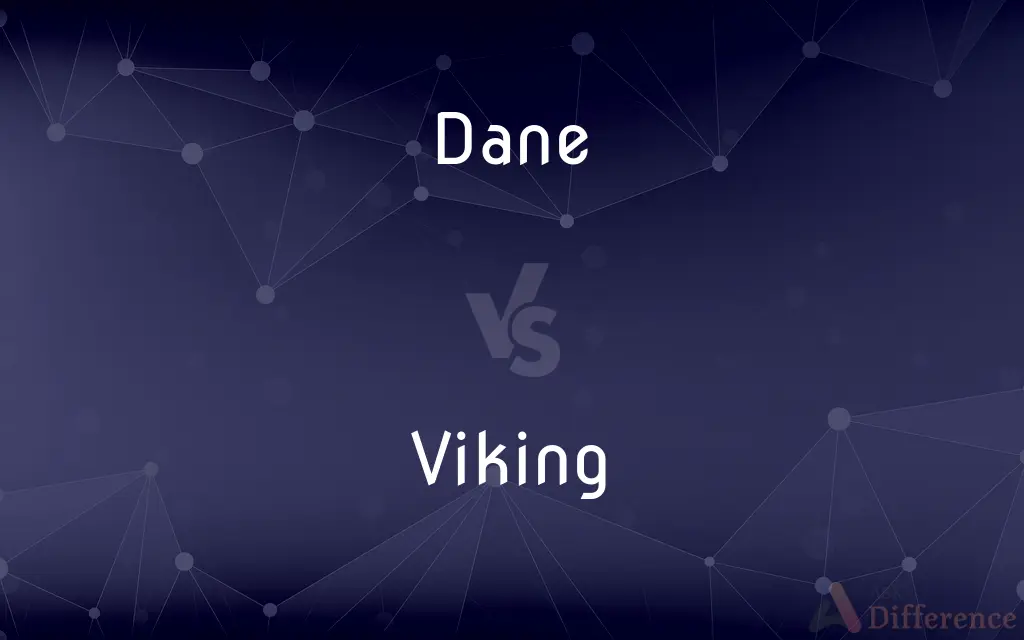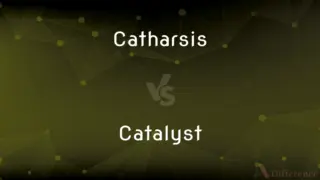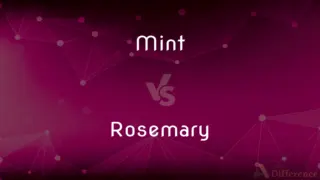Dane vs. Viking — What's the Difference?
By Urooj Arif & Fiza Rafique — Updated on April 1, 2024
Danes refer to the people from Denmark, part of the Nordic countries, while Vikings were seafaring warriors from the Nordic region during the Viking Age.

Difference Between Dane and Viking
Table of Contents
ADVERTISEMENT
Key Differences
Danes are the citizens of Denmark, a country located in Northern Europe, known for its rich cultural heritage, progressive social policies, and high standard of living. Vikings, on the other hand, were Norse explorers, traders, and warriors who originated from Denmark, Norway, and Sweden, known for their raids and expeditions across Europe between the 8th and 11th centuries.
While all Vikings were Norsemen, not all Norsemen, including the Danes, were Vikings. The term "Viking" specifically refers to the individuals who took part in these overseas expeditions. In contrast, Danes include all people from Denmark, irrespective of their occupation or lifestyle, highlighting a distinction between a modern nationality and a historical role.
Culturally, the Danes have contributed significantly to arts, literature, and philosophy, particularly during the Danish Golden Age in the 19th century. Vikings, while often remembered for their raids and battles, also had a rich culture with notable achievements in shipbuilding, navigation, and the establishment of trade routes that linked the Nordic countries with other parts of Europe and even Asia.
In terms of language, modern Danes speak Danish, a North Germanic language. The Vikings spoke Old Norse, the ancestor of all modern Scandinavian languages, including Danish, Swedish, Norwegian, Icelandic, and Faroese. This linguistic evolution reflects the historical and cultural development from the Viking Age to contemporary Scandinavia.
The term "Viking" has undergone a reevaluation in modern times, with increased focus on their roles as traders, settlers, and contributors to European culture, rather than just raiders. Meanwhile, being Danish now implies a connection to Denmark's current cultural, social, and political life, emphasizing the difference between contemporary national identity and historical roles.
ADVERTISEMENT
Comparison Chart
Definition
Citizens of Denmark
Norse seafarers from the Viking Age
Region
Denmark
Nordic countries (Denmark, Norway, Sweden)
Period
Present
8th to 11th century
Culture
Modern Danish culture, arts, and social systems
Ancient Norse culture, shipbuilding, exploration
Language
Danish
Old Norse
Compare with Definitions
Dane
Reflects progressive policies and a strong social welfare system.
Denmark, the country of the Danes, is renowned for its quality of life.
Viking
The Viking legacy includes not only tales of conquest but also contributions to the cultures and societies they encountered.
Vikings founded some of the first cities in Ireland.
Dane
Represents modern citizens of Denmark.
Danes enjoy a high standard of living.
Viking
Were part of the seafaring Norse people from the Viking Age.
Vikings were known for their raids and expeditions across Europe.
Dane
Speak Danish, a Scandinavian language.
Danes are taught English and often a third language in school.
Viking
Had a rich culture with advancements in shipbuilding and navigation.
Viking longships were technologically advanced for their time.
Dane
While some Danes were Vikings, the term now refers to all citizens of Denmark.
Modern Danes are proud of their Viking heritage but are not Vikings themselves.
Viking
Not just raiders, they were also traders and explorers.
Vikings established trade routes that reached as far as the Byzantine Empire and Greenland.
Dane
Known for contributions to literature, art, and philosophy.
The works of Hans Christian Andersen, a Dane, are world-famous.
Viking
Spoke Old Norse, which is the ancestor of modern Scandinavian languages.
The sagas, written in Old Norse, tell stories of Viking adventures.
Dane
A native or inhabitant of Denmark.
Viking
One of a seafaring Scandinavian people who raided the coasts of northern and western Europe from the eighth through the tenth century.
Dane
A person of Danish ancestry.
Viking
A Scandinavian.
Dane
A native, or a naturalized inhabitant, of Denmark.
Viking
One belonging to the pirate crews from among the Northmen, who plundered the coasts of Europe in the eighth, ninth, and tenth centuries.
Of grim Vikings, and the raptureOf the sea fight, and the capture,And the life of slavery.
Dane
A native or inhabitant of Denmark
Viking
Any of the Scandinavian people who raided the coasts of Europe from the 8th to the 11th centuries
Common Curiosities
How is Danish culture different from Viking culture?
Danish culture is marked by modern achievements in the arts, social systems, and governance, while Viking culture was characterized by its shipbuilding, exploration, and Norse mythology.
Are all Danes descendants of Vikings?
While many Danes can trace their ancestry back to the Viking Age, not all Danes are direct descendants of Vikings.
What language did Vikings speak?
Vikings spoke Old Norse, the precursor to the Scandinavian languages spoken in the Nordic countries today.
What impact did the Vikings have on Europe?
Vikings significantly impacted European history through their raids, trade, and settlement, influencing the cultural and genetic makeup of many regions.
Who are the Danes?
Danes are the people from Denmark, a country in Northern Europe, known for its culture, history, and social welfare system.
What defines a Viking?
Vikings were Norse seafarers from the Viking Age, known for their exploration, trading, and raiding across Europe and beyond.
Is Viking a nationality?
Viking is not a nationality but rather a term for the Norse people who engaged in expeditions during the Viking Age.
Did Vikings have a written language?
Vikings used runes for inscriptions, but the Old Norse language, used in sagas and tales, was mostly transmitted orally during the Viking Age and written down in later periods.
What role do Danes play in the European Union?
Denmark is an active member of the European Union, contributing to its policies, economy, and cultural initiatives.
Were Vikings only from Denmark?
No, Vikings came from all over the Nordic region, including Norway and Sweden, not just Denmark.
How do modern Danes view their Viking heritage?
Many modern Danes take pride in their Viking heritage, seeing it as a part of their country's rich history and cultural identity.
What distinguishes Viking ships from other historical ships?
Viking ships were highly advanced for their time, designed for speed, flexibility, and oceanic voyages, including the famous longships.
Can someone today be considered a Viking?
While people today can study and emulate Viking culture, the term "Viking" specifically refers to individuals from the Viking Age.
What are some common misconceptions about Vikings?
Common misconceptions include the belief that Vikings wore horned helmets and were barbarians; in reality, they had a complex society with laws, art, and global trade networks.
How do historical Viking values influence Denmark today?
Elements of Viking values, such as exploration, community, and resilience, can still be seen in Danish society's emphasis on innovation, social cohesion, and welfare.
Share Your Discovery

Previous Comparison
Catharsis vs. Catalyst
Next Comparison
Mint vs. RosemaryAuthor Spotlight
Written by
Urooj ArifUrooj is a skilled content writer at Ask Difference, known for her exceptional ability to simplify complex topics into engaging and informative content. With a passion for research and a flair for clear, concise writing, she consistently delivers articles that resonate with our diverse audience.
Co-written by
Fiza RafiqueFiza Rafique is a skilled content writer at AskDifference.com, where she meticulously refines and enhances written pieces. Drawing from her vast editorial expertise, Fiza ensures clarity, accuracy, and precision in every article. Passionate about language, she continually seeks to elevate the quality of content for readers worldwide.
















































